 During their years at war, thousands of the young recruits sent to Angola, Guinea-Bissau and Mozambique took photos of what surrounded them: their comrades, barracks, landscapes, daily life, the civilian population, and the military apparatus. These images managed to evade the censorship of the regime, and were stored away or sent by mail as proof of their distant lives.
Some of these men built improvised darkrooms, others managed to access official ones. Many visited photography shops that flourished as a consequence of the demand generated by the war, and many bought and exchanged images. All this created the photographic archives of which we here present a part.
During their years at war, thousands of the young recruits sent to Angola, Guinea-Bissau and Mozambique took photos of what surrounded them: their comrades, barracks, landscapes, daily life, the civilian population, and the military apparatus. These images managed to evade the censorship of the regime, and were stored away or sent by mail as proof of their distant lives.
Some of these men built improvised darkrooms, others managed to access official ones. Many visited photography shops that flourished as a consequence of the demand generated by the war, and many bought and exchanged images. All this created the photographic archives of which we here present a part.
I'll visit
05.01.2022 | by Inês Ponte and Maria José Lobo Antunes
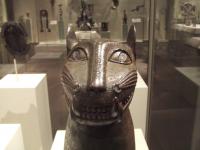 The past five years have seen a flurry of activity around issues of restitution of African material heritage, resulting in new reports, new books and even, new returns. Along with this sudden surge in activity there has been an escalation in debate around these questions, where positions once thought to be entrenched, racist, conservative, and considered mainstream, seem to have shifted dramatically. In the frenzy, it can begin to feel as if things are changing and that society is progressing. But we’d do well to pause for deeper dives and more systematic remembering of what has come before.
The past five years have seen a flurry of activity around issues of restitution of African material heritage, resulting in new reports, new books and even, new returns. Along with this sudden surge in activity there has been an escalation in debate around these questions, where positions once thought to be entrenched, racist, conservative, and considered mainstream, seem to have shifted dramatically. In the frenzy, it can begin to feel as if things are changing and that society is progressing. But we’d do well to pause for deeper dives and more systematic remembering of what has come before.
To read
28.12.2021 | by
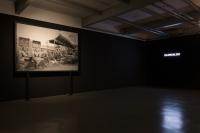 “The Mechanics of the Ephemeral” stems from the idea that art as a mechanism allows us to travel to different temporal spaces by adopting an approach that often resorts to fantasy, but in which the imagination becomes an important ally in historical and socio-political questioning. Although the discourses of the invited artists vary in their approaches and navigation of this temporal and identity- forming flow, the common denominator is their relationship with a continent inhabited by the dreams and follies of foreign ghosts. There is also an urgent need to address a future still based on meaningless promises of progress and freedom – a situation which is not exclusive to the African continent – to equally embrace the influences of the various artistic languages and references that comprise this joint work and overflow national borders and continental platforms.
“The Mechanics of the Ephemeral” stems from the idea that art as a mechanism allows us to travel to different temporal spaces by adopting an approach that often resorts to fantasy, but in which the imagination becomes an important ally in historical and socio-political questioning. Although the discourses of the invited artists vary in their approaches and navigation of this temporal and identity- forming flow, the common denominator is their relationship with a continent inhabited by the dreams and follies of foreign ghosts. There is also an urgent need to address a future still based on meaningless promises of progress and freedom – a situation which is not exclusive to the African continent – to equally embrace the influences of the various artistic languages and references that comprise this joint work and overflow national borders and continental platforms.
I'll visit
21.12.2021 | by Gisela Casimiro
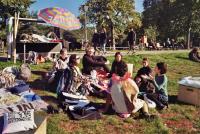 The following dialogue was conducted after the very first action. “Common Ground” was a reading session in which organizers and participants from different cultural backgrounds and with different native languages faced the problem of translation and the complicated, thorny question of language hierarchy in academia (and thus, a hierarchy of ideas). In this dialogue, now reproduced in the written form of an interview, Sala had fulfilled her genuine wish to break the “collective isolation” that many people - including artists - have been facing until now.
The following dialogue was conducted after the very first action. “Common Ground” was a reading session in which organizers and participants from different cultural backgrounds and with different native languages faced the problem of translation and the complicated, thorny question of language hierarchy in academia (and thus, a hierarchy of ideas). In this dialogue, now reproduced in the written form of an interview, Sala had fulfilled her genuine wish to break the “collective isolation” that many people - including artists - have been facing until now.
To read
09.12.2021 | by Cheong Kin Man
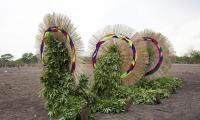 In the contemporary discussions regarding post-colonial Europe, the concepts of memory and post- memory have taken on growing importance, giving prominence to an insight with great political relevance: colonialism never ends with those who enforced or suffered it. Traces of a colonial mindset impregnate generations to come and it has been passed down through the image of the former coloniser and the former colonised. These characters restage a complex phantasmagoria closely related to the most intimate ghost of the European subconscious: its colonial ghost which manifests itself inter alia in the form of a colonial “transfer of memory” – as racism, segregation, exclusion, subalternity – or in the form of “eruptions of memory”, and thereby questions the very essence of European multicultural societies, shaped by colonial heritage and fed by waves of migration.
In the contemporary discussions regarding post-colonial Europe, the concepts of memory and post- memory have taken on growing importance, giving prominence to an insight with great political relevance: colonialism never ends with those who enforced or suffered it. Traces of a colonial mindset impregnate generations to come and it has been passed down through the image of the former coloniser and the former colonised. These characters restage a complex phantasmagoria closely related to the most intimate ghost of the European subconscious: its colonial ghost which manifests itself inter alia in the form of a colonial “transfer of memory” – as racism, segregation, exclusion, subalternity – or in the form of “eruptions of memory”, and thereby questions the very essence of European multicultural societies, shaped by colonial heritage and fed by waves of migration.
To read
31.10.2021 | by Margarida Calafate Ribeiro
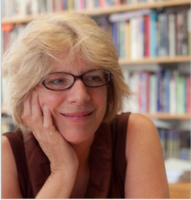 Today, I think that the field is challenged more than ever by the increased volatility of debates about what nations remember and consequentially forget. Monuments and memorials are being vandalized, torn down, officially removed. They can no longer be seen as simply part of an historical landscape. Much of this can be understood as battles over the historical narratives of monuments and their power, but it is also about tensions around who the nation mourns and who it sees or does not see as having a “grievable life” in Judith Butler’s term. So I see memory activism as a key site for the production of memory scholarship.
Today, I think that the field is challenged more than ever by the increased volatility of debates about what nations remember and consequentially forget. Monuments and memorials are being vandalized, torn down, officially removed. They can no longer be seen as simply part of an historical landscape. Much of this can be understood as battles over the historical narratives of monuments and their power, but it is also about tensions around who the nation mourns and who it sees or does not see as having a “grievable life” in Judith Butler’s term. So I see memory activism as a key site for the production of memory scholarship.
Face to face
25.10.2021 | by Inês Beleza Barreiros
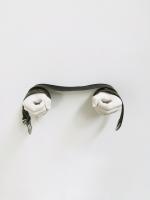 The exhibition Europa Oxalá is also the ideal time to deconstruct the colonial myth and the post-colonial melancholy designated as “African art”. Attributed to all artistic production that originates in the African continent, the expression has been used to differentiate it in a coarse way from all the art included in the compendiums and narratives of the universal history of art founded in the Western matrix. So-called African art was seen as an art without authorship, disconnected from the diversity of its production contexts, be they a country of North Africa, of the South or the east or west coast, be it the 14th or 20th century.
The exhibition Europa Oxalá is also the ideal time to deconstruct the colonial myth and the post-colonial melancholy designated as “African art”. Attributed to all artistic production that originates in the African continent, the expression has been used to differentiate it in a coarse way from all the art included in the compendiums and narratives of the universal history of art founded in the Western matrix. So-called African art was seen as an art without authorship, disconnected from the diversity of its production contexts, be they a country of North Africa, of the South or the east or west coast, be it the 14th or 20th century.
To read
18.10.2021 | by António Pinto Ribeiro
 The long history of advocacy around “women’s rights are human rights” features activists from the Global South and women of color in the US. For instance, in 1945, at the founding of the United Nations, Latin American feminists played a critical role in trying to advance “women’s rights” into the category of human rights. And after World War II, when the US Black freedom movement often deployed human rights arguments, Pauli Murray, the attorney, feminist, and civil rights advocate, argued specifically that “women’s rights are a part of human rights.” What changed at the end of the 20th century was that a far-reaching and expanding global feminist movement began to collectively use the idea that “women’s rights are human rights” to advocate for change at the United Nations and beyond.
The long history of advocacy around “women’s rights are human rights” features activists from the Global South and women of color in the US. For instance, in 1945, at the founding of the United Nations, Latin American feminists played a critical role in trying to advance “women’s rights” into the category of human rights. And after World War II, when the US Black freedom movement often deployed human rights arguments, Pauli Murray, the attorney, feminist, and civil rights advocate, argued specifically that “women’s rights are a part of human rights.” What changed at the end of the 20th century was that a far-reaching and expanding global feminist movement began to collectively use the idea that “women’s rights are human rights” to advocate for change at the United Nations and beyond.
Body
08.10.2021 | by Lisa Levenstein
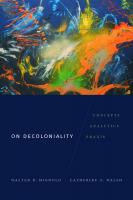 There is no Afro-Brazilian art student I have met who is not enthusiastic about Mbembe’s thoughts. This is definitely a good sign; an expression of the growing debate about racism, hidden for too long in Brazil. The current political situation does not leave space anymore for denial. It is also a reflection of two factors: firstly, the complexity of the relation between decoloniality and globalisation in the South; and secondly, the relation between publishing policies and the circulation of critical thought.
There is no Afro-Brazilian art student I have met who is not enthusiastic about Mbembe’s thoughts. This is definitely a good sign; an expression of the growing debate about racism, hidden for too long in Brazil. The current political situation does not leave space anymore for denial. It is also a reflection of two factors: firstly, the complexity of the relation between decoloniality and globalisation in the South; and secondly, the relation between publishing policies and the circulation of critical thought.
To read
07.09.2021 | by Laura Burocco
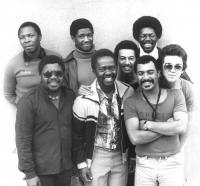 And so, as we engage with vinyl reissues such as these, we are also engaging in a fight against forgetting much more than just music. These are valuable artifacts of South Africa’s musical history that were transcendent of repressive daily conditions. Challenges remain in the here and now. The vibrant, radical artists of today’s South African jazz are the descendants of such soothsayers of the non-verbal, speaking truth to that which cannot be silenced. They are still learning to look at themselves differently, still redreaming the world, hidden gods speaking from within them a new language we will all need to learn in order to talk to each other. It’s about much more than just music.
And so, as we engage with vinyl reissues such as these, we are also engaging in a fight against forgetting much more than just music. These are valuable artifacts of South Africa’s musical history that were transcendent of repressive daily conditions. Challenges remain in the here and now. The vibrant, radical artists of today’s South African jazz are the descendants of such soothsayers of the non-verbal, speaking truth to that which cannot be silenced. They are still learning to look at themselves differently, still redreaming the world, hidden gods speaking from within them a new language we will all need to learn in order to talk to each other. It’s about much more than just music.
Games Without Borders
21.08.2021 | by Liam Brickhill
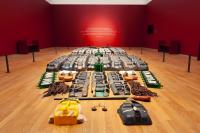 Rather than perceiving a national museum as a mere repository of cultural artefacts emblematic of either the elite’s values or its fetishization of those it excludes and rejects, the curators of Slavery have fully embraced their educational responsibility and their duty to actively contribute to cultural life in the present. All of which cannot prevent a feeling from remaining, that the fires of purgatory still rage on and much must yet be done to extinguish them.
Rather than perceiving a national museum as a mere repository of cultural artefacts emblematic of either the elite’s values or its fetishization of those it excludes and rejects, the curators of Slavery have fully embraced their educational responsibility and their duty to actively contribute to cultural life in the present. All of which cannot prevent a feeling from remaining, that the fires of purgatory still rage on and much must yet be done to extinguish them.
To read
15.08.2021 | by Paulo de Medeiros
 From the 14th of July, the website of the Tchiweka Documentation Association (ATD) is open to the public, putting online a large part of the archive that, since 2006, its Documentation Center has been managing, organizing and expanding.
From the 14th of July, the website of the Tchiweka Documentation Association (ATD) is open to the public, putting online a large part of the archive that, since 2006, its Documentation Center has been managing, organizing and expanding.
I'll visit
13.07.2021 | by Associação Tchiweka de Documentação
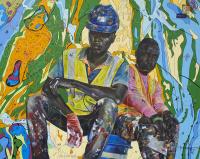 Jean’s aim is to give these people and their frustrations a voice, and to make the viewer confront their own perspectives on migration. “I think a lot about the indifference that characterizes the complicit silence of the rest of the world towards victim states,” he says. “I’m inviting an awareness necessary to free the world from these dehumanizing practices.”
Jean’s aim is to give these people and their frustrations a voice, and to make the viewer confront their own perspectives on migration. “I think a lot about the indifference that characterizes the complicit silence of the rest of the world towards victim states,” he says. “I’m inviting an awareness necessary to free the world from these dehumanizing practices.”
Games Without Borders
01.07.2021 | by Jean David Knot and Alex Kahl
 Hoje o Tarrafal é um museu e monumento nacional e, desde 2004, integra a lista indicativa de Património Mundial da UNESCO. Portugal, para além de ter ajudado com a criação e desenvolvimento deste museu, anunciou em 2019 que iria apoiar Cabo Verde com a sua candidatura do Tarrafal à UNESCO. Recentemente, foram levadas a cabo obras de restauro do espaço, por uma empresa portuguesa, e no próximo 5 de Julho, os governos de Cabo Verde e Portugal vão assinar um memorando de entendimento para a candidatura deste espaço à UNESCO.
Hoje o Tarrafal é um museu e monumento nacional e, desde 2004, integra a lista indicativa de Património Mundial da UNESCO. Portugal, para além de ter ajudado com a criação e desenvolvimento deste museu, anunciou em 2019 que iria apoiar Cabo Verde com a sua candidatura do Tarrafal à UNESCO. Recentemente, foram levadas a cabo obras de restauro do espaço, por uma empresa portuguesa, e no próximo 5 de Julho, os governos de Cabo Verde e Portugal vão assinar um memorando de entendimento para a candidatura deste espaço à UNESCO.
Mukanda
24.06.2021 | by Sofia Lovegrove
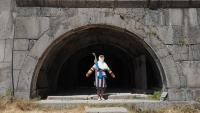 Though based in Amsterdam, Lyuba has made work all over the world – from Japan to Aruba – at art residencies or as a visiting teacher. Wherever she goes, she researches the myths and tales told in that place as inspiration for the characters she builds and the masks they wear. Lyuba is fascinated by Joseph Campbell’s theory of artists as shamans who create the myths that reflect our reality. “Shamans use masks to travel to different realities, to travel to different worlds,” she says, “And in a way I do the same through my artwork.”
Though based in Amsterdam, Lyuba has made work all over the world – from Japan to Aruba – at art residencies or as a visiting teacher. Wherever she goes, she researches the myths and tales told in that place as inspiration for the characters she builds and the masks they wear. Lyuba is fascinated by Joseph Campbell’s theory of artists as shamans who create the myths that reflect our reality. “Shamans use masks to travel to different realities, to travel to different worlds,” she says, “And in a way I do the same through my artwork.”
To read
18.06.2021 | by Lyubov Matyunina and Alix-Rose Cowie
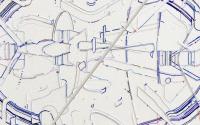 He titles all of his works Bug Report, named after the message you might see on a computer screen to tell you about program errors or defects. No matter how complex and polished his diagrams and blueprints might seem, he wants to make it clear that they can still be flawed and faulty. “In any highly controlled system, it can hardly be said that there is no possibility of an error,” he says. “There are always some questions around security in this seemingly complete world. In my drawings, the thread is a material symbolizing the imperfect structure of society.”
He titles all of his works Bug Report, named after the message you might see on a computer screen to tell you about program errors or defects. No matter how complex and polished his diagrams and blueprints might seem, he wants to make it clear that they can still be flawed and faulty. “In any highly controlled system, it can hardly be said that there is no possibility of an error,” he says. “There are always some questions around security in this seemingly complete world. In my drawings, the thread is a material symbolizing the imperfect structure of society.”
To read
17.06.2021 | by Keita Mori and Alex Kahl
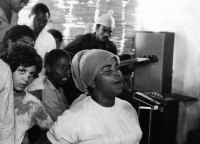 How a music shaped by slavery, epidemics, famine and mass migration travelled the world, narrating stories of suffering and resistance. Over time, morna, also known as “música rainha” (“queen music”), underwent several changes to its melodic and rhythmic characteristics, becoming the slower, more mournful version heard today. Characterised by three dimensions of melody, poetry and dance, morna is often sung in Kriolu, Portuguese-based Creole, though it can be instrumental, too.
How a music shaped by slavery, epidemics, famine and mass migration travelled the world, narrating stories of suffering and resistance. Over time, morna, also known as “música rainha” (“queen music”), underwent several changes to its melodic and rhythmic characteristics, becoming the slower, more mournful version heard today. Characterised by three dimensions of melody, poetry and dance, morna is often sung in Kriolu, Portuguese-based Creole, though it can be instrumental, too.
Stages
26.05.2021 | by Beatriz Ramalho da Silva
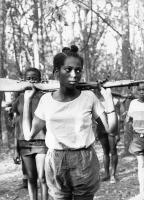 No history of decolonization or of decolonizing praxes is ever completed without attention to gender. How did women view the liberation struggles in the former Portuguese colonies? How were their ways of seeing integrated or not in the imagination of colonialism? Was there a specific gaze to women over the liberation struggles? What knowledge and awareness do we have of/about these ways of seeing? And how do these ways of seeing intersect with those of contemporary filmmakers, artists, curators and academics who are now questioning public and private archives, are visually recreating their memories or re-imagining colonialism? What role academic research, archive conservation policies, programming and curatorship have in questioning or prolonging (official) “politics of memory”?
No history of decolonization or of decolonizing praxes is ever completed without attention to gender. How did women view the liberation struggles in the former Portuguese colonies? How were their ways of seeing integrated or not in the imagination of colonialism? Was there a specific gaze to women over the liberation struggles? What knowledge and awareness do we have of/about these ways of seeing? And how do these ways of seeing intersect with those of contemporary filmmakers, artists, curators and academics who are now questioning public and private archives, are visually recreating their memories or re-imagining colonialism? What role academic research, archive conservation policies, programming and curatorship have in questioning or prolonging (official) “politics of memory”?
Afroscreen
22.05.2021 | by Ana Cristina Pereira (AKA Kitty Furtado), Inês Beleza Barreiros and Maria do Carmo Piçarra
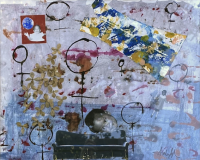 This article demonstrates that antifeminist agendas (often labelled as anti-gender ideology by proponents) are key to understand how ethnonationalist, xenophobic and racist discourses are forwarded by far-right parties in Portugal and across Europe. Therefore, it focuses on the intersections between antifeminism, including femonationalism, and anti-immigration agendas, examining how gendered and racialized tropes are used in conjunction in far-right propaganda.
This article demonstrates that antifeminist agendas (often labelled as anti-gender ideology by proponents) are key to understand how ethnonationalist, xenophobic and racist discourses are forwarded by far-right parties in Portugal and across Europe. Therefore, it focuses on the intersections between antifeminism, including femonationalism, and anti-immigration agendas, examining how gendered and racialized tropes are used in conjunction in far-right propaganda.
To read
19.05.2021 | by Rita Santos and Sílvia Roque
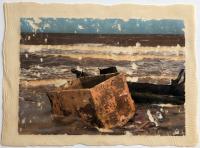 In her first solo exhibition at Simone Cadinelli Art Gallery, Jeane Terra shows works that are related, directly or indirectly, to the events in Atafona, that are about the ruins produced by the clash between the sea and the city; such events point to the fact that everything that was, is or will be built is going to turn into rubble.
In her first solo exhibition at Simone Cadinelli Art Gallery, Jeane Terra shows works that are related, directly or indirectly, to the events in Atafona, that are about the ruins produced by the clash between the sea and the city; such events point to the fact that everything that was, is or will be built is going to turn into rubble.
Mukanda
16.05.2021 | by Agnaldo Farias